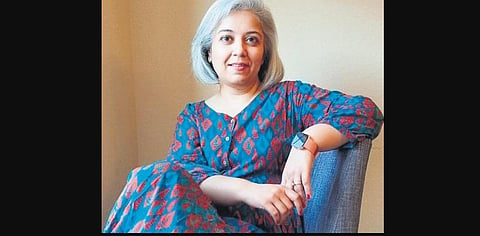

BENGALURU: Ratno Dholi: The best stories of Dhumketu, translated from Gujarati by Jenny Bhatt (HarperCollinsIndia, Rs 319) has 26 short stories written by the critically acclaimed Gujarati author. USA-based Bhatt, who has written a collection of short stories called Each of Us Killers, was introduced to the writings of Gaurishankar Govardhanram Joshi aka Dhumketu (1892-1965) through her mother, and says translating his work was nothing less than an honour for her. Excerpts from an interview:
When did you first come across Dhumketu’s works?
My mother was a big reader of Gujarati literature, especially short stories. While growing up, I had often heard her mention Dhumketu and Meghani. She’d even tell me and my siblings some of the stories as bedtime tales. When I left my corporate job in 2012 to focus on writing, she kept urging me to do a Gujarati-to-English translation project with her, but I wanted to focus on my own writing. I regret not having done this project with her then. When she passed away suddenly in 2014, I inherited her small personal library and she had almost all of Dhumketu’s fiction — the short story collections and the novels.
What do you like most about Dhumketu’s stories?
I have appreciated the recurring themes in his stories, and translating his work has opened up more profound aspects of the Gujarati language and culture for me. And, although my fiction is more influenced by Western literary traditions, seeing how he broke certain literary traditions of his time to pioneer different ways of storytelling has been inspiring.
How do you think Dhumketu’s writings still hold relevance today?
First, his stories balance exteriority and interiority to explore the inner worlds of his characters through their experiences of external events. This is what we do today in contemporary storytelling. Second, his stories are about people from all walks of life — rural to royal, young to old — and often from the lower classes and castes. While this is normal for writers now, it wasn’t so in Gujarati literature until his time. Third, he wrote of strong, independent-minded women and emotionally sensitive men, which was again a deviation from the gender norms in fiction then.
Which of Dhumketu’s works is your favourite and why?
It’s hard to choose any one favourite work, given his vast oeuvre. It was difficult enough to select 26 stories to translate from more than 600 that he had written. Earlier this year, I read his two memoirs, Jivan Rang and Jivan Panth. They gave me a fresh view into his personal life, his different jobs, and his writing-related struggles.
Did you always want to be a writer?
From the time that I could write, I’ve been making up stories
on the page. At the age of 10, I won a children’s short story competition. Of course, since that event, I told everyone I was going to grow up to be a writer. My parents encouraged something more practical with engineering. But I appreciate all the years of corporate life because they’ve given me so much grist for the writerly mill. I feel I’m a better writer in my 40s than I could have been in my 20s.
Has knowing Dhumketu’s works helped you while translating the book?
Having read all of Dhumketu’s more than 600 short stories before translating the selected 26 for this collection was certainly critical. It allowed me to understand his main themes and preoccupations and get a good sense of his authorial style, voice, and intentions. Also, exploring the ideas and emotions of his characters from another time and culture deepened my awareness and comprehension of my own present world. All of this was hugely helpful to ensure I was translating stories from a previous literary era appropriately for today’s readership.